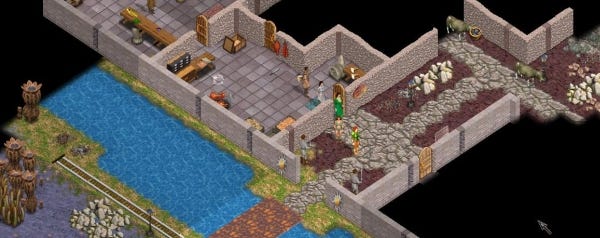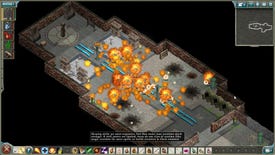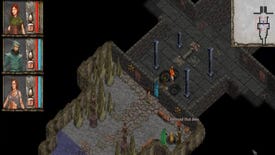Wot I Think: Avernum - Escape From The Pit
Old School Is The New New School
Spiderweb Software have one intention: to keep making 90s-style RPGs, and to keep making them good. Avernum: Escape From The Pit is their latest, technically the seventh game in the Avernum series (although presented with a fresh start), the 20th game from the developers, and the first of their games I've played. So from that perspective, and despite having spent so many hours still only a fraction of the way in, here's Wot I Think:
I just had my laundry done. For no reason. Not only does it not make any practical change to my experience, but it doesn't even make an aesthetic change to what I'm seeing. 10 coins in the hut in Fort Draco, and I still got it done. Which is perhaps the surest sign that I'm very deeply embroiled in the underground world of Avernum: Escape From The Pit.
We seem to be spoiled for games emulating early RPGs, with Legend Of Grimrock so superbly recapturing the late 80s joy of Dungeon Master/Eye Of The Beholder, and now Avernum, laser-focusing on that moment in the late 90s when the RPG suddenly came back to life. It was, I must confess, a moment that completely passed me by, my interests elsewhere in the realms of gaming. And one I'm all the poorer for having missed. So weirdly, Avernum isn't an experience of nostalgia for me, but rather just really bloody great RPG.
A really bloody great RPG that I do often feel I'm playing on the other side of reinforced glass, my arms protruding via thick rubber gloves. Oh, Avernum, why must you have gone out of your way to be such a pain?
The set up is pretty nice. You are playing as four adventurers, cast into the vast cave system of Avernum as a punishment for undisclosed crimes. The world above is only learned about through snippets told by the game's hundreds of NPCs, or through the text describing your own reactions to events. The Empire, a clearly dictatorial force, is expelling any who may rebel, or simply not fit in to their regime, into the inescapable pits, and then forgetting about them. So very many people are now there, and have been there for so long, that what should ostensibly be a prison has become its own nation, huge stretches of caves and caverns containing multiple towns, secrets, and most of all, some dragons.
Arriving in the city to which all new arrivals emerge, you're greeted by officials who explain the deal. There's no escape, don't bother trying, and be careful. Between the towns, and constantly threatening their existence, are multiple hostile races. Goblins, neraphim, the undead, and so on, have their own plots and machinations. Then there's all the talk of the Magi Tower, the Great Cave, and the King's Castle within it. Oh, and those dragons too.
And then you can go where you like. Which is an extraordinary feeling. It's not that you can complete the game's sections in any order you wish - there are no sections. There's just you, a flipping great big cave, and places to go. The game does throw out some hints. Villagers will suggest places you could head to for work, support, or to do them favours. And if you head South early on, it will throw up a warning saying you might find it too difficult down there just now. But you can still go there if you fancy your chances.
And your chances are slight. This is a tough game on Normal, at least at first. Before you've got your party well equipped and started levelling them up, pretty much any encounter is going to be a challenge. I admit I dropped things to Casual at the game's insistence that I'd have "more fun", just to leap that first hurdle. Then a while later put it back up to Normal once I was more experienced. Character deaths aren't so serious, however. So long as one of your party survives, you can head back to the nearest friendly town and all will be revived. And there are various spells to bring characters back mid-battle/dungeon if necessary.
Then everything else you want from an RPG is in place, really. Stats are pleasingly simple, but open to huge variation. Mages and Priests have a great arsenal of spells. Inventories are enormous, and there's no weight restriction on anything you're not actively equipping - and a junk bag lets you keep things uncluttered while still hoovering up loot to sell at the next town. Combat is frequent and turn-based. The lengthy descriptions and interesting conversations are detailed and often witty. It's all there. Behind that bloody screen.
I've not played any of the previous Spiderweb games - they're perhaps most famous for the Geneforge RPGs made in the previous decade. These things may be true of all their games, but I can assure you they're annoying here. Perhaps with excellent intentions, the game has been designed to work with mouse or keyboard, or a combination of the two. But literally can be played without the mouse at all. Everything has a keyboard shortcut, from picking a spell from a list to choosing inventory items to sell. I'm sure that's great for the twelve people on Earth who don't like using a mouse, and it's certainly an enormous show of dedication to the PC version of a game that's also out on iOS. But it also means that there's no chance to redefine keys for yourself, making all the basic interactions a real pain in the arse. To see what's on the ground after a fight, or in a room, you press G. Great. To close that window you, well, don't press G. In fact, pressing G may well have you steal an item from someone that's on that shortcut. Instead you have to click the close button with the mouse, or hit Escape. Sure, that's not a big deal, but it's a constant pain. And it's true of everything. Open the Mage spell panel with M, and only Escape will close it. Hitting M again does nothing. And more mysteriously, clicking on the Mage spell button with the mouse opens it, but again, doesn't close it. I'm sure reading this people are thinking, "What a picky idiot", but believe me, as you're playing it becomes so utterly infuriating. Shortcut keys should offer shortcuts, and not require three hands.
Then there are some rather peculiar aesthetic choices. Viewed from an isometric perspective, with no options for rotating the camera, some of the design choices are extremely strange. Objects become hidden by opaque walls, which becomes even worse when it's you and the enemy you're fighting being obscured. Put the mouse over a character or object (that you can't see in the first place) and they'll glow through, but not by default. And putting a mouse on something is no mean feat when the camera is quite so far zoomed out. I've tried and tried to find an option for zooming in, but none seems to exist. And for a large part, it's the right distance. Occasionally, when my tired old eyes can't make something out, I'm left leaning into the monitor and squinting.
It doesn't stop me though. And I think that's pretty crucial. Despite being near-constantly frustrated by a basic lack of intuitive interaction (and the pretty awful pathfinding) I just want to keep playing, keep exploring, and figure out whether I want to make a life for myself in Avernum, or eventually try to escape.
Don't be put off by this being the seventh Avernum game. It's a fresh start, a relaunch perhaps, and I've had no prior knowledge about the series and haven't hit a single issue for that. At just over a fiver, this is an exceptional amount of game, and a really great RPG. Quite how they're making those mistakes twenty games in I'm not quite sure, but often great writing, a simple and effective turn-based combat system, and a great sense of freedom and exploration make for a superb time that overrides the hefty niggles.
You can get Avernum for $20 directly from Spiderweb. Or you can get it far cheaper on Steam for £5.59.
















